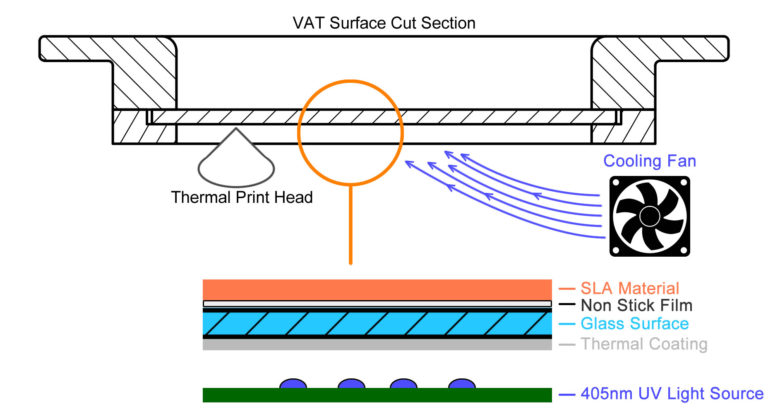Aug 1 2017
Cyprus-based 3D printer manufacturer Ilios 3D got its second wind shortly after a December announcement that it would shut down, coming back with renewed determination and a new 3D printer, the Ilios Photon 2.
Since then, Ilios 3D has been providing us with regular updates on the continued development of the Photon 2, and it seems as though the prospect of closing lit a new fire of creativity under the company and its founder, Demetris Ruslan Zavorotnitsienko, because along with regular testing and improvement of the Photon 2, Ilios 3D has also found a way to improve stereolithography (SLA) 3D printing itself.
 Credit: Ilios 3D
Credit: Ilios 3D
This week, Ilios 3D introduced Thermal Masking technology, a new technique developed in the company’s laboratory. The technology is based on three features: a vat glass coating, a thermal print head and a controlled cooling process.
“The coating of the glass surface is done within the Ilios laboratory and is a mix of a Black Opaque heat sensitive pigment which when exposed to heat becomes transparent and a specific clear coat which protects the pigment during long print cycles and ensures the coating remains on the glass surface for long periods as well as protects it from scratches,” Zavorotnitsienko explains. “The VAT is assembled in several layers to ensure the correct light exposure, cured resin detachment and sealed environment free of leaks. Additionally the VAT accommodates the Heated Print Head which runs over the back surface of the coated glass during prints.”
Three layers coat the top and bottom of the glass. The top layer is SLA 3D printing material, beneath which is a protective, non-stick film. The bottom of the glass is coated with a thermal, heat sensitive coating that comes into direct contact with the heated print head during the 3D printing process. When the heated print head passes over, the mask becomes completely opaque, blocking all light not required for layer curing and eliminating the need for anti-aliasing measures.
“In order to apply a controlled layer of heat on the VAT surface, a heated print head is used,” Zavorotnitsienko continues. “The same heated print technology is used in devices such as Label printers and other printers with a thermal paper coating. As the thermal print heads are highly affordable and are simple in controlling, this allows the core of the Thermal Masking technology to be affordable as well and provide reliable as well as tested components to ensure a voxel dense layer is exposed each time. The resolution of the heated layer is directly determined by the resolution of the print head used since the actual coating on the VAT glass surface contains very fine particles of the opaque heat sensitive pigment and can achieve theoretical resolutions as dense as the particles themselves.”
Finally, a fan is used to provide a controlled cooling environment for the coated surface. Without controlled cooling, the masking surface dissipates too slowly, so a fan is activated to cool the surface after each layer, then deactivated. According to Ilios 3D, this can affect print speed, but only slightly and only in hot environments.
There are several advantages to Thermal Masking technology, according to Zavorotnitsienko. It’s less expensive than other forms of SLA 3D printing because the required parts are so cheap, and because only a few components are required. There’s no need for additional lenses, mirrors or optical components. Ilios 3D is introducing the technology with the new Ilios Nano 3D printer, a small, entry level 3D printer with a price tag of only €250. The Nano, says Ilios 3D, isn’t comparable to other Ilios 3D printers such as the Photon 2, which has much higher resolution, but for its cost, it’s a good starter printer.
The Ilios Nano features a build size of 60 x 80 x 120 mm, a resolution of 84 microns, and a layer thickness of 50-100 microns. You can learn more about Thermal Masking technology here.